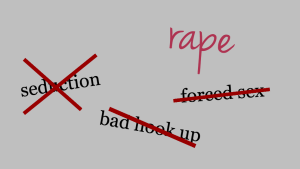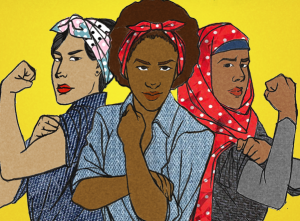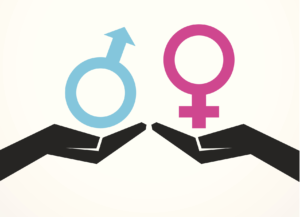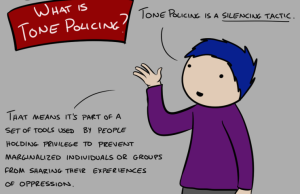
Source: Not Adam and Steve
With Ellen Page’s recent coming out, the queer community has just cause to celebrate.
While Page’s position of privilege might make her circumstances foreign to most, it’s nevertheless encouraging and important that an increasing number of public figures is willing to take a stand and set an example for their fans.
In her speech, Page confessed that she felt as though she was “lying by omission” in her failure to explicitly confirm her sexuality, which has been a source of speculation since her Hollywood debut.
The reaction was overwhelmingly positive. Queer women collectively rejoiced. The Human Rights Campaign (HRC) posted a headline congratulating Page on her decision to “live authentically.”
But what is queer authenticity? And who gets to define it?
The Fallout from Coming Out
Several aspects of the Page aftermath rubbed me the wrong way.
First, you have those in the straight and queer communities alike jumping at the chance to say, “I told you so.”
They claim that they are underwhelmed because Page coming out is a nonevent – really, they scoff, who did she think she was fooling?
Don’t be that jerk. Coming out is a personal decision and a big deal for a lot of people.
No matter how much you allegedly anticipated their sexuality, don’t belittle the significance of their actions and their right to have their voices heard and respected.
Especially when it comes to public figures, that representation is invaluable.
Even today, revealing your personal life can have an incredibly harmful effect on your career. It’s heavy stuff that shouldn’t be reduced to elementary gay jokes.
I was also particularly uncomfortable with the rhetoric that everyone, including Page herself, was using.
“Lying,” “omission,” and “authentically” all strongly connote deception, as if the person in the closet is intentionally attempting to trick those on the outside. And that just doesn’t sit well with me.
Coming Out Isn’t a Singular Moment
I think in Western culture, we’ve begun to associate the queer experience as a linear progression, marked by shame and suspicion until the person finally decides to bust open that closet door, signaling their willingness to accept their true selves.
The association of positive emotions with coming out reinforces this feel-good narrative.
An out person is much more likely to be described as brave, courageous, or proud, whereas a person still in the closet is implied to be dishonest, delusional, or self-loathing.
The reality isn’t so simple.
A professor of mine once described the closet as an architecture. You carry it with you wherever you go.
We like to tell ourselves that you only have to come out once, but that just isn’t true.
The closet isn’t a Band-Aid that you rip off once. You often have to come out repeatedly for your entire life.
And that’s the heart of the issue. That’s why the myth of the closet as the magical gateway to a legitimate queer future starts to unravel.
Coming out isn’t for everyone, and that should be okay.
Creating false hierarchies of authenticity for queerness only leads to internalized guilt (“I have to come out or else I’m being fake”) and hurts those on the margins for whom coming out isn’t feasible.
Why Wouldn’t You Come Out?
It’s ridiculous that we have to bother going through the list of reasons to not come out, but it just goes to show how deeply ingrained the pro-out mindset has become.
There are the obvious ones: Someone’s family might reject them. Maybe they don’t have a stable source of income or can’t support themselves and don’t want to risk being homeless.
It’s also understandable if they still love the people who raised them, despite differing perspectives, and simply don’t want to lose that support system.
Maybe someone would lose their job.
Maybe if they came out, they would be ineligible for necessities, such as medical care.
Many cultural and religious backgrounds unfortunately don’t accept or recognize non-hetero sexualities.
The list goes on.
You shouldn’t feel pressured to choose between your orientation and your way of life if you don’t want to.
Lastly, but equally important: Coming out over and over again is annoying and exhausting. Some people just don’t want to subject themselves to that.
It’s laughable and somewhat creepy that we expect people to make their sexuality public knowledge in order to make their identity whole.
Unless you’re involved with someone, you have no right to know and even less of a right to care. No one owes you an explanation of their preferences.
Choosing to reveal or not reveal your sexuality is not a reflection of your pride in yourself or lack thereof, nor is it an appropriate barometer for deeming people worthy or unworthy of respect.
It’s personal, and personal should be considered private unless the person decides otherwise.
Coming Out Is Your Choice
I don’t mean to tarnish or demonize anyone’s decision to come out in any way. Coming out can be great, and there are many who consider it an essential part of embracing their identity.
My point is that we shouldn’t judge someone for not handling their personal life in ways that we deem appropriate.
In the case of celebrities and public figures, I know many people are hungry for a greater and more vocal queer representation, but remember that that does not obligate the celebrity in question to formally announce their sexuality.
Public figures have private lives.
Not only is it a phenomenal amount of pressure to be expected to become a figurehead for the queer community in the public eye, but I’d imagine it would be frustrating to potentially have your entire body of work overshadowed by speculation about who you might be dating or sleeping with.
The most unfortunate side effect of the closet stigma is that queer people have adopted the mainstream mentality that unless they go out of their way to explicitly mention their sexuality, they must be lying.
I’ll use myself as an example.
I come from a privileged environment where I don’t have to worry about my safety or parental rejection or financial repercussions.
Despite this and the fact that I’m single, I still get uneasy when I’m around my groups of friends who don’t know that I’m bisexual.
I’m so heavily involved in the queer community, I worry about slipping up and saying something that would make my friends uncomfortable or alter their perception of me.
I feel like I’m intentionally keeping a secret by not saying anything, even though it’s never been brought up in conversation.
But why should I tell them if it’s completely irrelevant to our relationship? At the same time, if I don’t want to tell them, does that mean I’m subconsciously ashamed of myself?
That’s the problem with the all-or-nothing logic of the closet. It can be empowering in certain contexts. However, it can also produce nasty, unnecessary self-doubt.
The closet doesn’t have to be a space of denial or embarrassment. For some people, it’s a safe haven and a refuge from the criticisms of the outside world.
Choosing to stay in it doesn’t make your identity less than anyone else’s.
Hell, you might decide that the closet doesn’t exist for you, and that’s cool too. Your sexuality doesn’t have to be your defining characteristic.
***
Ultimately, if and when you come out is totally your choice.
If you do – congratulations!
If you don’t – you do you!
Your sexuality and your identity exist through your experiences, not in jumping through hoops to earn the validation of others.
I’m happy that Ellen Page is happy she came out.
Regardless, her life was, is, and always will be authentic.
[ultimatesocial_facebook custom_class=”fb-btn-us”] [ultimatesocial_twitter custom_class=”tw-btn-us”]
Want to discuss this further? Login to our online forum and start a post! If you’re not already registered as a forum user, please register first here.
Erin Tatum is a Contributing Writer at Everyday Feminism. She’s a feminist, queer theory lover, and television enthusiast living in Pennsylvania. She is particularly interested in examining the representation of marginalized identities in media. In addition to Everyday Feminism, she’s also a weekly contributor to Bitch Flicks. Follow her on Twitter @ErinTatum91 and read her articles here.
Search our 3000+ articles!
Read our articles about:
Our online racial justice training
Used by hundreds of universities, non-profits, and businesses.
Click to learn more




















